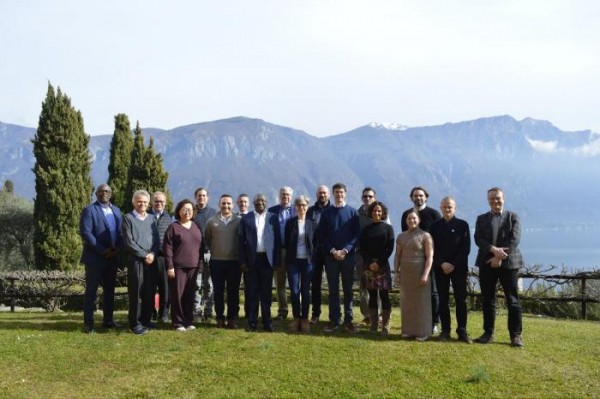UMD-Led Team to Create New International Center for Rapid Agricultural Assessments
NASA Harvest, a multidisciplinary consortium of experts in agriculture and satellite-based Earth observation that is administratively housed within the University of Maryland’s Department of Geographical Sciences (GEOG), will soon create a center that aims to increase and expedite international collaboration on issues related to food security.
The Remote-sensing Agricultural Assessments for Policy Impact and Decision-making (RAAPID) center—formerly known as RAAPS—will be a natural extension of the work that NASA Harvest has already done with governments, private sector organizations, farmers, space agencies, and humanitarian organizations to monitor crop conditions and food supplies around the world using satellite data. Such insights have helped shape better policies, assess global trade impacts, and improve decision-making in food and agriculture systems.
“Since Harvest began in 2017, we’ve consistently been asked to provide quick assessments of how droughts, floods, and even conflict affect agricultural production—particularly in areas where getting boots on the ground just isn’t possible. What we didn’t have was the surge capacity: a dedicated team ready to turn satellite data into rapid, actionable insights in real time,” NASA Harvest Founding and Co-Director Inbal Becker-Reshef, a GEOG research professor said.
'With new support from Google.org's AI Collaborative: Food Security initiative, together with support from Microsoft AI For Good Lab (where Becker-Reshef now serves as the Managing Director, while remaining NASA Harvest Co-Director), and public institutions including the Famine Early Warning Systems Network (FEWS NET), AMIS and FAO, Arizona State University, University of Strasbourg, VITO Remote Sensing, and humanitarian groups—the RAAPID center intends to solve Harvest’s surge capacity problem by bringing together a global network of experts and partners who can more quickly respond to incoming requests.
A sense of shared responsibility and participation is central to Harvest’s mission, and will be critical to RAAPID’s success by ensuring local to global relevance and long-term impact.
“Everything we do is shaped and driven by those who will actually use the information,” explained Christopher Justice, NASA Harvest Co-Director and UMD Distinguished Professor. “We make sure our end users are part of the assessment process from the start so they trust the analysis, the data meets their needs, and that they’re able to act on it. You can provide the highest quality data, but if it wasn’t co-developed with the people who need it, why would they use it or trust it? There has to be a close partnership with those who will ultimately rely and act on the information we produce.”
Becker-Reshef, Justice, and their expert team are already engaging partners from across the globe to co-build RAAPID. With support from the Rockefeller Foundation, the team convened leaders across food security, agriculture, satellite data, and AI—including individuals from the World Food Programme, UN Food and Agriculture Organization, the International Grain Council, the Group on Earth Observations Global Agricultural Monitoring Initiative (GEOGLAM), Agricultural Market Information System (AMIS), the East African Grains Council, AGRA, Google.org, Microsoft AI For Good, Planet, the Arrell Food Institute and others—to shape the center and its operating model. Analysis will be led by teams embedded within leading partner organizations, including UMD, coordinated by an agile secretariat and steered by a multi-stakeholder board and technical steering group.
This convening, held at the Rockefeller Foundation’s Bellagio Center, served as a catalyst for structuring, scaling and operationalizing RAAPID.
“RAAPID was born out of a real and growing need for trusted information when and where it matters most,” said Mary Mitkish, NASA Harvest Deputy Director. “Our goal is to leverage our wide network of agriculture and remote sensing experts to close critical information gaps during crises—especially in places where ground access is limited.”
RAAPID’s mission is to harness cutting-edge advances in satellite remote sensing and AI to deliver transparent, timely, and actionable insights in response to food system shocks—whether from extreme weather, armed conflict, or market volatility. By producing rapid, co-developed agricultural assessments, the center aims to empower governments, humanitarian actors, and market stakeholders to take pre-emptive action, enhance disaster response and recovery efforts, and support resilient markets and trade systems.
“Our food system is highly interconnected; it's rare for a crisis in one country to affect only that country,” Becker-Reshef said. “Food security is a global challenge, and timely, trusted information is essential. The good news is that we now have the tools, data, technology, and increasingly the partnerships across communities to rise to this challenge.”
This article was originally published by the College of Behavioral and Social Sciences (BSOS).
Published on Tue, 10/07/2025 - 17:28


